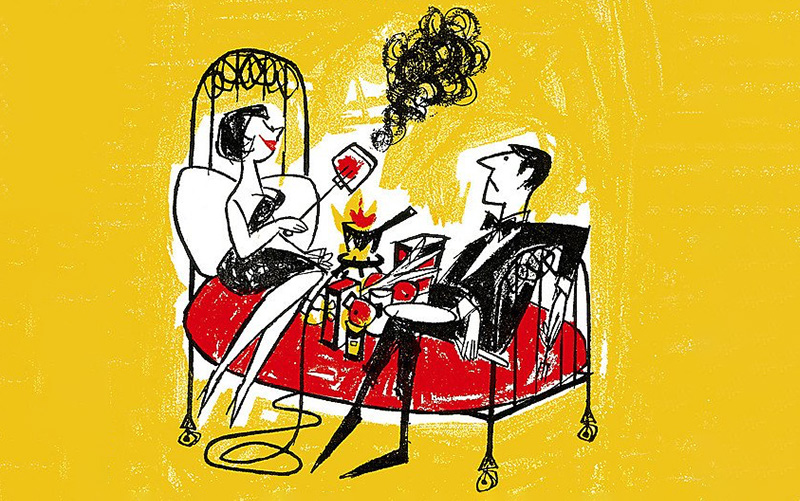Words by Laura Freeman
Essay
Tiny Kitchens
A larder of one’s own

Words by Laura Freeman
Small-kitchen cooking is a matter of attitude. Laura Freeman recalls the kitchens that have made her steam, simmer and spit like boiling oil.
Our flat in Paris was the British Embassy booby prize. No one stayed there long. As in a game of pass-the-hot-potato, the trick was to serve your six months and leave it to the newest, greenest recruit. Two years ago, the young Foreign Office gun was my then fiancé, now husband, Andy. At lunches and dinners with his colleagues, we’d get sympathetic nods. “That kitchen,” they’d sigh. At best it is a kitchenette, or in my blacker, more pan-throwing moods, a kitchen-not. It was dark, awful and, above all, small. I could stand in the centre of the room and touch all four corners. The oven was over the sink; the window looked out onto a wall. Pots of desperate herbs were alternately scorched by the toaster and scalded by the kettle. I used to stone plums and chop onions kneeling at the coffee table in the sitting room.
I resented the books that insisted: French Women Don’t Get Fat, French Women Don’t Grow Old, French Children Don’t Throw Food. You know the genre. A year in France taught me that these paragons of virtue weren’t French Women, but Parisian Women. Added to the list of things Parisian Women Don’t Do was: Parisian Women Don’t Cook. They eat out, they collect from the local traiteur, they have a coffee and a cigarette when a hungry Englishwoman would have her midday meal.
Pots of desperate herbs were alternately scorched by the toaster and scalded by the kettle
Years ago, a former boyfriend took me for breakfast with his cousin who lived in a true artist’s garret high in a Haussmann boulevard on the Rive Gauche. She was the perfect Parisienne, immaculate, slender and tall. Too tall, in fact, for the sloping ceilings of her otherwise perfect apartment. She had to crawl on hands and knees to retrieve the electric hotplate from under a futon beneath the eaves. On this hotplate, sitting cross-legged and straight-backed on the floor, she cooked round after round of parchment-fine crêpes. They were – mais, bien sûr – perfect.
Our kitchen in the Marais was not the smallest kitchen I had ever cooked in – there had been postage stamps to the Paris matchbox – but it was the one that vexed me most. I hadn’t minded making do and muddling through in my twenties – awkward kitchens were a right of passage – but I was thirty when we lived in Paris and through my scullery years.
I had learnt to cook in a college gyp-room. A ‘gyp’, once upon a university time, was a college bedder who tidied rooms and served the tea. Now students fend for themselves, though the corridor kitchens remain. I shared mine with a dozen Wyverns. The Wyvern is a dragon with the tail of a snake. Dragons and rugby players, I discovered, wreak much the same chaos. That freshers’ year gyp-room was relentlessly greasy with hungover breakfasts. In my first week, while scraping bacon fat from the Baby Belling, a Wyvern appeared at the door. “I like a girl in rubber gloves,” he told me. I was “Miss Marigold” for the rest of the term.


On a trip to Japan I made egg-drop misos on the single hob of a Tokyo studio. In Kyoto, in a Fisher-Price play kitchen, I cooked Scott's porridge oats from a Tupperware stored in my suitcase. After two weeks of onigiri rice parcels with anchovy eyes, I had craved the breakfast of home. On a rented canal boat in Maida Vale I rustled a Full English fry-up while my other half crouched at the prow. No room for spectators in that narrowest of galley kitchens. In a gothic folly in Kent I stirred onions, orzo and porcini in a tiny, circular kitchen on the topmost floor of a turret. Now, aged 32, I am kitchen broody. My culinological clock is ticking. As my friends try for babies, I dream not of cots and pushchairs, but of six-burner stoves and vast fridge-freezers. A larder of one’s own.
In Paris I had tried to read myself into acceptance. M.F.K. Fisher, I told myself, had managed in Marseille. That southern kitchen, Fisher writes in Long Ago in France, “was perhaps the least dignified of any of a long lifetime of them. It was part of a miserable little bathroom: a two-burner gas plate beside the washbowl, a saucepan and a soup pot on the shelf for toothpaste and combs.” Laurie Colwin in her essay Alone in the Kitchen With An Eggplant describes the eight years she lived in a one-room apartment in Greenwich Village, New York. The room, she writes, was: “a little larger than the Columbia Encyclopaedia.” She washed dishes in the bathtub, and on two hot-plates cooked veal-and-black-bean soups and endless aubergines.
Jocasta Innes, in her introduction to The Pauper’s Cookbook, devotes a section to what she calls “Wherewithal”: “Improvisation is the keyword here. Paupers are often pushed for space as well as cash.” Double up on equipment, says Innes. But don’t skimp. “When money is tight, one spends it on food rather than kitchen scales, sets of mixing bowls or measuring spoons.” That being said, if a pauper is to make successful pastry, she will need her stretch of floured surface. In Cooking In A Bedsitter, Katherine Whitehorn writes that successful small-kitchen cooking is a matter of attitude. It is no good lamenting: “Me all alone in my little room with my little pan and my little spoon.” You must think: “Me with my enormous appetite and my huge stewpan.”
In Paris, I took Whitehorn’s advice. After a week cursing Her Majesty’s Foreign Office saucepans, bottoms thin as paper, handles flimsy as card, I marched to the Le Creuset shop on Rue des Rosiers and bought a casserole and an omelette pan in the January sales. It was a drab, grey day – the wettest January for fifty years – and the Seine had burst its banks. In that dark and awful kitchen I christened the pan with eggs and felt less homesick and cold. As omelettes go, it was, if I may say so myself, perfect.






